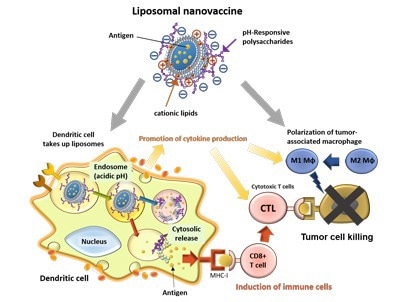Reviewed by Emily Henderson, B.Sc.Nov 1 2022
Cancer immunotherapies, for instance, immune checkpoint inhibition therapy, have been garnering attention in the last few years as new approaches for cancer treatment. But immune checkpoint inhibition therapy is only successful in 20%–30% of patients with cancer. Thus discovering improved drug delivery platforms to trigger anticancer cellular immunity is imperative.
 Cationic lipid-introduced pH-responsive polysaccharide-modified liposomes to achieve efficient antigen delivery and high activation of antigen-presenting cells toward induction of antigen-specific immune responses. Image Credit: Osaka Metropolitan University.
Cationic lipid-introduced pH-responsive polysaccharide-modified liposomes to achieve efficient antigen delivery and high activation of antigen-presenting cells toward induction of antigen-specific immune responses. Image Credit: Osaka Metropolitan University.
A team of researchers directed by Associate Professor Eiji Yuba of the Graduate School of Engineering at Osaka Metropolitan University has been creating an antigen carrier, using liposomes with pH-responsive polysaccharides on their surface to transport cancer antigens to dendritic cells.
By integrating positively charged cationic lipids into liposomes, the researchers have, at present, effectively created their new drug delivery platform to intensely trigger cellular immunity, using one-tenth of the amount of antigen that was necessary earlier. The findings were published by Elsevier in the October 31st issue of the Journal of Controlled Release.
To boost the efficacy of these liposomal nanovaccines, cellular immunity must be triggered more efficiently. Therefore, the research team concentrated on cationic lipids, which are said to trigger immune cells.
The research team incorporated positively charged cationic lipids into the liposomes, which then boosted the quantity of negatively charged pH-responsive polysaccharides that could be integrated into the surface of the liposome.
Since dendritic cells—a kind of antigen-presenting cell—effortlessly take up negatively charged particles, the uptake of these altered liposomes by the dendritic cells increased by around five times, resulting in an estimated 100-time increase in the production of cytokines.
When the altered liposomes were delivered to the cancer tissue, M1-type macrophages, which support the anticancer immune response, improved, while M2-type macrophages, which can stimulate cancer growth, diminished.
When a vaccine using these liposomes was given to mice that had been inoculated with cancer cells, a robust anticancer immune reaction was triggered, subduing cancer growth even though the liposomes only comprised one-tenth of the quantity of antigen required in the team’s earlier work.
In the future, we will continue developing antigen carriers that can be used in cancer immunotherapy and vaccines for infectious diseases by combining them with practical antigens.
Eiji Yuba, Study Lead Author and Associate Professor, Graduate School of Engineering, Osaka Metropolitan University
Journal Reference:
Yuba, E., et al. (2022) Cationic lipid potentiated the adjuvanticity of polysaccharide derivative-modified liposome vaccines. Journal of Controlled Release. doi.org/10.1016/j.jconrel.2022.10.016.